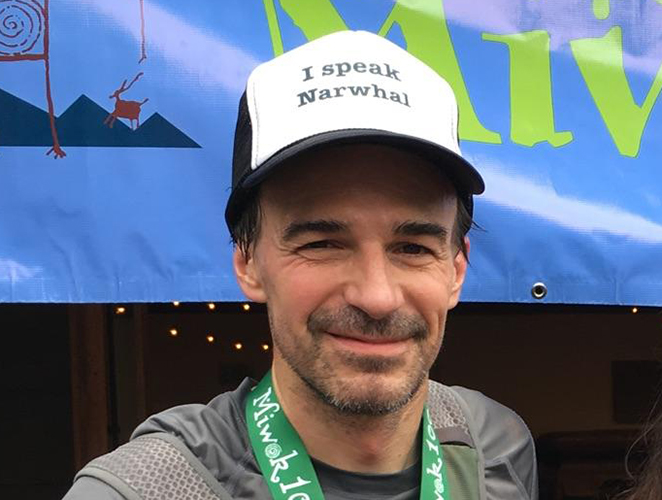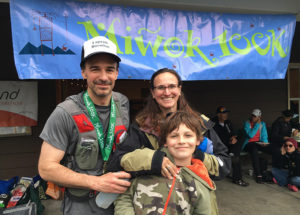
Q: As an endurance athlete, what are 3-5 essential race-day items for you in terms gear, clothing, shoes, etc.?
A: Wrightsocks – only ever wear this brand, anytime of the year
Desitin – You know where to put it, use it liberally when you go long
Band aids – nipple chaffage sucks!
Always bring warm clothing regardless of the time of year, quickest way to a DNF is to be under clothed for the conditions.
 Q: What does your typical training week look like when you are preparing for an endurance event?
Q: What does your typical training week look like when you are preparing for an endurance event?
A: I don’t tend to key any single event but rather keep decent fitness all year long. Ultra-distance running is never fast so I don’t worry about speed work for my big events of the year. For you locals, I do go to tower road once a week to do hill repeats. I tend to then work speed and cross training into the gaps of the season between big events because it makes this time more interesting. I also seem to need to be both on the bike and in the gym with high intensity weights once a week to balance the running mileage.
Q: When you are participating in an endurance event, you’re obviously going to encounter some moments of extreme discomfort and pain. How do you push through ‘the wall?’
A: I start to feel significant muscular discomfort when events get longer than 50K, which in some strange way is why I like them. Your mind can be your best friend or worst enemy. I use the knowledge that I can suffer and enjoy it, and that discomfort and mental weakness will always cycle from highs to lows and back again to continue to push through about anything. When all else fails, find an extrovert to run with… at least temporarily.
Q: Do you visualize before you compete? If so, can you share and how has it paid off?
A: No, I’m a lazy person and don’t like to spend the time on this. It’s more fun to pay attention to the weirdness that these events seem to concentrate in one place and be amused than to be too focused on yourself. It’s difficult for me to want to visualize a 100mile run or a 3 day adventure race anyway. It’s more fun to visualize the beer I’m going to drink after the race. The longer the event, the more likely you are to visualize imaginary creatures anyway.
Q: What is your biggest challenge to your motivation and how do you overcome it?
A: The need to be organized / plan ahead / make decisions. I have to admit that one reason I like ultra-running is because of the lack of gear required both to purchase and transport to the race start. I tend to stick to the same clothing / equipment that I always use which makes it easier for me to pack because I’ve put the same stuff in the race bin time and time again. I tend to repeat good events for many years in a row, because I don’t have to think about the course and how to race it. I tend to choose races that my family will want to go to so that they can help me get organized. Then of course when I can, I sign up for an event with a friend. Nothing more motivating than racing with / against a friend.
Q: Who is the person (or people) who have had the most influence on your athletic success?
A: My college track / cross country coach. He was 50 some years old and would run all the workouts with us, often faster than us.
Q: If you could go back in time and give one piece of advice to yourself regarding your athletic accomplishments and undertakings, what advice would that be?
A: Go long earlier in life. I didn’t get into ultra-distance racing until I was in my 30’s after a long time in triathlon and road races. I made the jump from triathlon to adventure racing because I got tired of racing alone. It wasn’t until I did this that I learned that being out for 24 hours, 48 hours, or even longer wasn’t a big deal. Wish I knew this earlier in life.
Q: What are your bucket list races or running goals?
A: My goals are to be a 80 or 90 year old runner still out there doing it, try cyclocross racing, complete an expedition length adventure race, earn a Western States 100 belt buckle, and race in mountains as often as possible.
Q: What is your favorite tech gear and why?
A: The Buff – this simple piece of clothing has prevented so many potentially hypothermic outcomes during events for me.